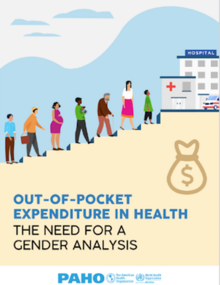The main purpose of this publication is to advocate for the need to understand the gendered nature of vulnerabilities to poor health. Gender equality in health is an integral dimension of sustainable development, and it is critical to apply a “gender lens” to all aspects of the health system, including financing mechanisms in health. The impact of health-related out-of-pocket expenditure (OPE) on household poverty has been a significant factor driving the move toward universal health coverage across much of Latin America and beyond. However, not only do health care users still face a broad range of health-related OPEs that can contribute to the impoverishment of households, but the gender dimensions of OPEs have received very little attention. Drawing primarily on data from Bolivia (Plurinational State of), Guatemala, Nicaragua, and Peru, this report offers an in-depth analysis of the gender dimensions of health-related OPEs in Latin America. It highlights the limitations of survey data in determining levels of household spending on health as well as the potential failure of indicators to capture the impacts of coping strategies that households adopt to pay for OPEs. This publication calls for the application of an intersectional analysis to ensure a more nuanced understanding of the ways in which other social identity markers, such as race and ethnicity, alongside gender shape the ability of individuals and households to respond to the different OPEs they may encounter. Until policymakers consider the issue through a gender lens, OPE will continue to limit the potential of universal health care coverage to effectively address health inequalities.
|

